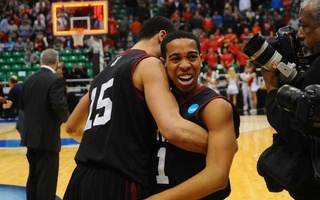Harvard placed fourth in a ranking of U.S. colleges released by the Economist late last month, coming in several hundred places ahead of peer institutions.
The Economist based the Oct. 29 rankings—the first ever released by the magazine—on “a simple, if debatable, premise: the economic value of a university is equal to the gap between how much money its students subsequently earn, and how much they might have made had they studied elsewhere.”
The rankings use the estimated salary of students with similar characteristics and compares that with the actual salaries of alumni. The ranking placed Harvard fourth, while Yale came in at 1,270th and Princeton was ranked 770th.
To create the rankings, the Economist pulled data from the Obama administration’s recently-created “College Scorecard” website, which aggregates statistics regarding a school’s average cost, graduation rate, and its graduates’ salaries.
Harvard’s Office of Career Services declined to comment on the rankings, and Yale’s Office of Career Strategy did not respond to requests for comment.
Peter F. Lake ’81, a professor at Stetson University College of Law who specializes in higher education law, said he was unsure how this new system would hold “in a crowded field of metrics.”
Describing the Economist’s findings as “interesting and intriguing” but not necessarily accurate, he suggested that people start looking for a “God Particle” or “one key” to ranking colleges “when you start being too objective.” Lake pointed to the last place ranking of Cooper Union, a highly selective college in Manhattan, as potential evidence of deficiencies in the ranking system.
Comparing this new metric with the status of traditional U.S. News and World Report college rankings, Lake said he “would be surprised if schools postured around this” new report.
Despite myriad criticisms of college rankings in general, Dean of Admissions and Financial Aid William R. Fitzsimmons ’67 has previously praised the dissemination of useful information about universities.
Read more in University News
Study: Carbon Dioxide Levels Correlated with CognitionRecommended Articles
-
Of Jellybeans and Ivy League RankingsA CCORDING to the October 16 issue of U.S. News & World Report, Harvard-Radcliffe ranks third among national universities. This
-
 Flyby's House Rankings: A Comparative History
Flyby's House Rankings: A Comparative History -
 HBS Topped by Stanford in US News Rankings
HBS Topped by Stanford in US News Rankings -
 No 'A' Grade for Harvard in Sex Ed
No 'A' Grade for Harvard in Sex Ed -
 Men's Hoops No. 21 in Early Rankings
Men's Hoops No. 21 in Early Rankings













